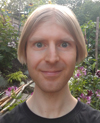 Christoph Gorgulla,
Christoph Gorgulla,
BMS Alumnus,
PhD completed in May 2018,
MSc Freie Universität Berlin,
BSc Freie Universität Berlin
During my Bachelor at the Freie Universität Berlin, I frequently heard about the BMS. And while what I heard was quite positive, I did not pay too much attention to this new school. One reason was that I was quite happy with the mathematics study program at the FU, and I wondered how much better could their study framework really be? I started to find out about that soon after one of my professors recommended me to apply at the BMS for my graduate studies. And I was truly surprised when I learnt and experienced how much additional value and quality a graduate school could provide to a study program.
One of the most characteristic features of the BMS is that it indeed has something of a large family, including both the students as well as the staff. The internationality of the students (since half of them are from foreign countries) was a great opportunity to get to know people from all over the world much better. The student community felt quite harmonious, in part also due to the gender equality in the BMS. And the staff members of the One-Stop Office are wonderfully kind and helpful regarding all sorts of issues.
Regarding mathematics and science, Berlin seemed like a paradise to me. The mathematical landscape is remarkably diverse and rich due to the three major universities in Berlin and various other research institutes. But what makes it particularly outstanding is that the various mathematical institutions here are supporting each other and collaborating extensively, which makes the mathematical environment in Berlin remarkably harmonious and synergistic. The BMS feels like a central element in this connectivity and unity in Berlin, because it has close connections to most institutes in Berlin that are related to mathematics. I was, for instance, able to join one of the associated units of the BMS (one of the International Max Planck Research Schools), which provided a valuable additional research environment since the IMPRS was specialized to my research field. Also, the courses and soft-skills seminars that the BMS offers are usually of high quality and can be quite supportive.
Berlin itself can be a wonderful city to live in as well. At first, almost everything is available in Berlin, and even though one may not make use of all the possibilities, it is just nice to have all possibilities. Also, the population density is not too high since Berlin is rather widely spread out. It is overall quite green, with many parks, boulevards, and even nearby forests. I personally lived in Dahlem, the district where also the FU is located, and I absolutely loved it there. It is really beautiful there, rather quiet, one does not have the feeling that one is living in a large city, and due to the subway one can reach other parts of Berlin quite quickly and conveniently.
Published in July 2018
Update August 2018: Christoph is Postdoctoral Research Fellow at Harvard University since July 2018.






















